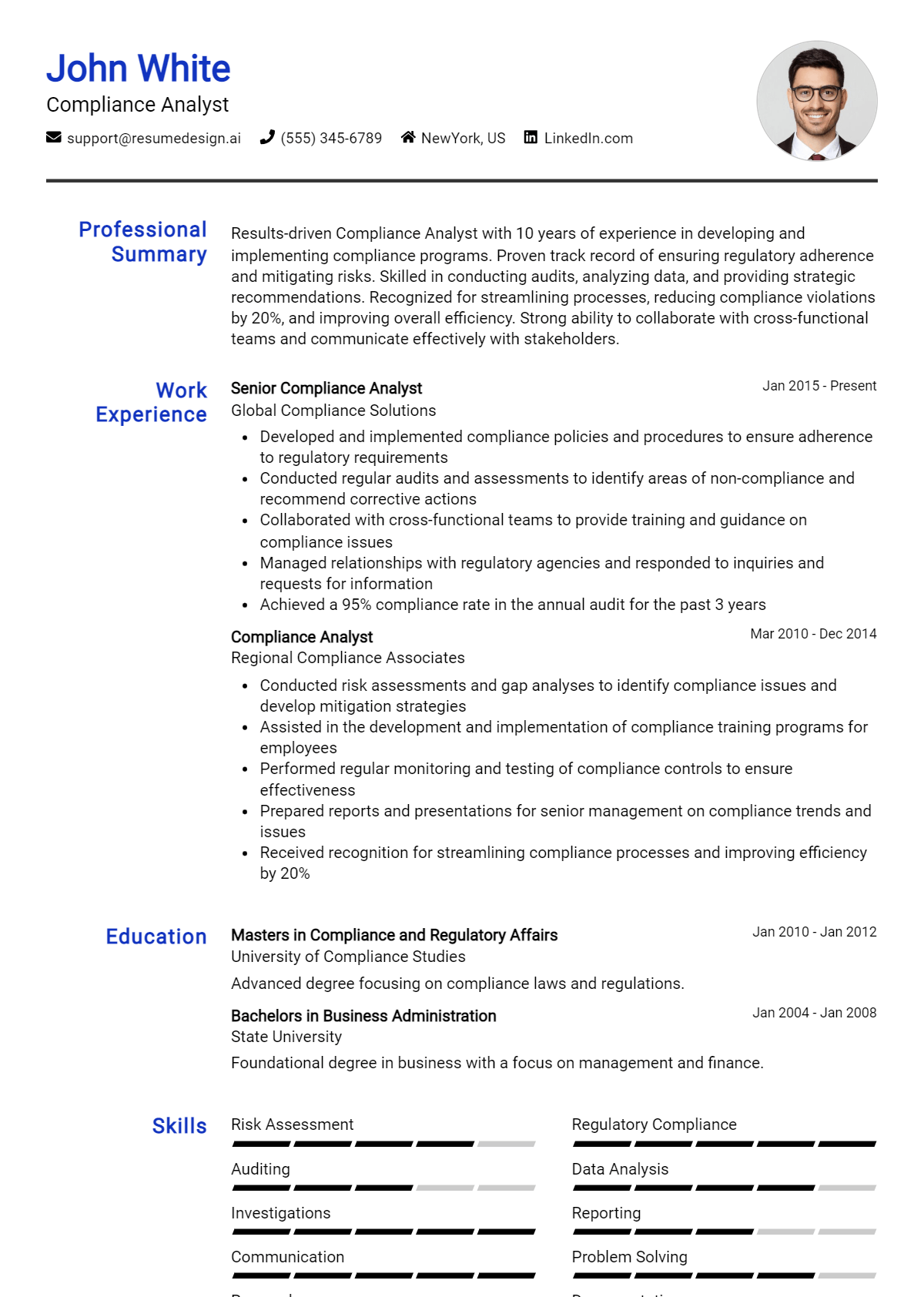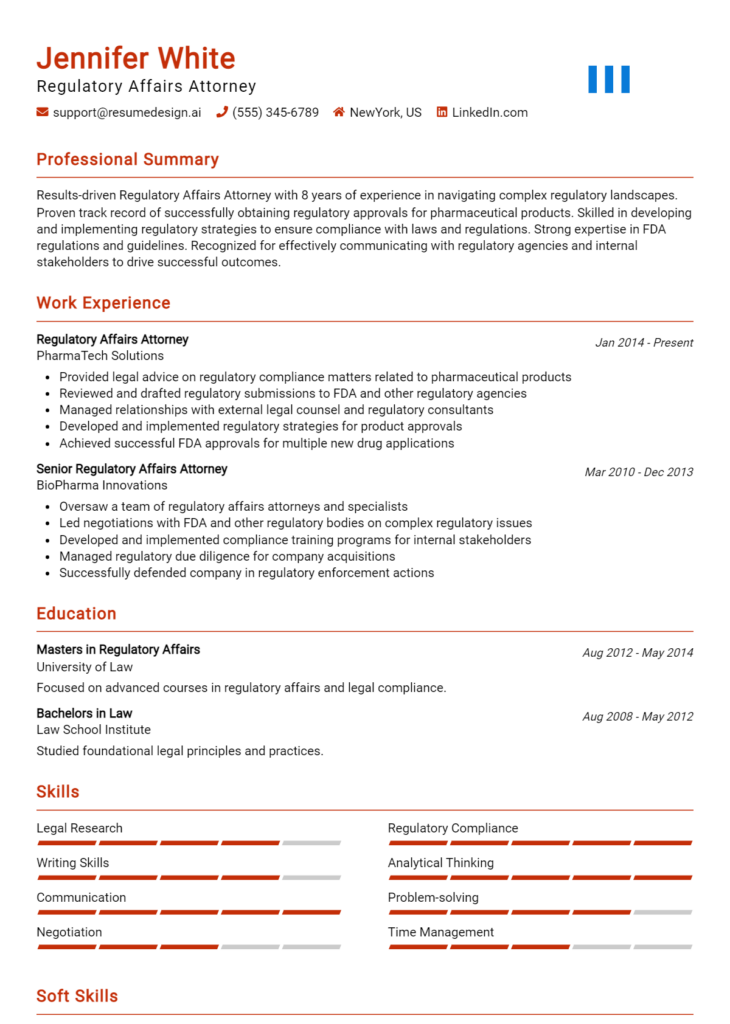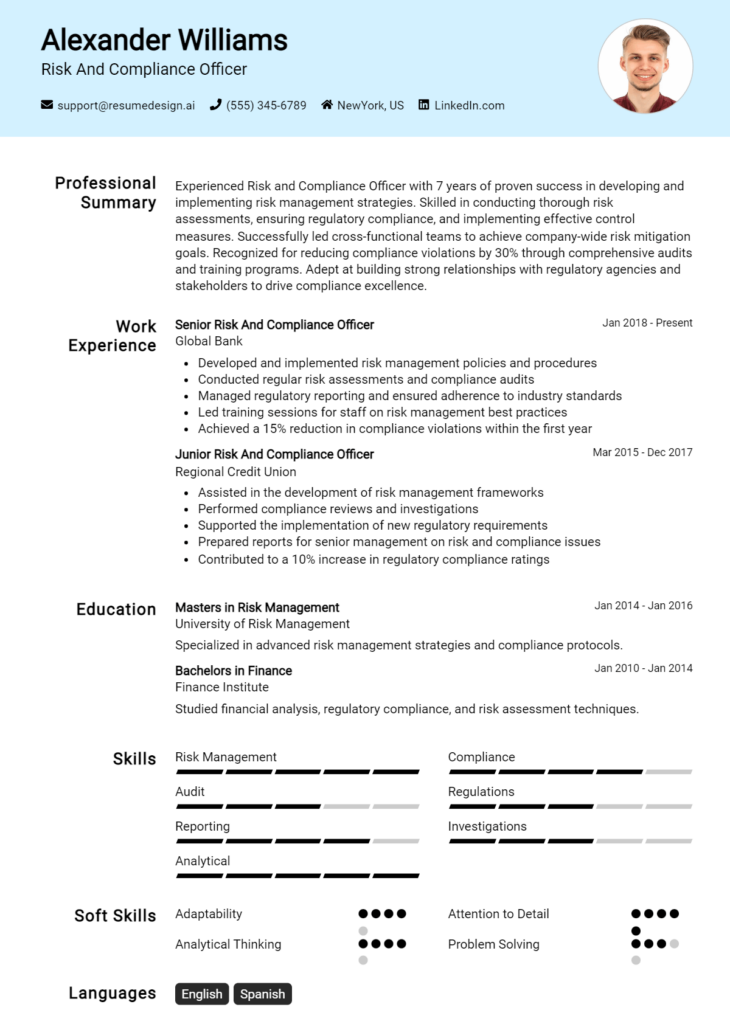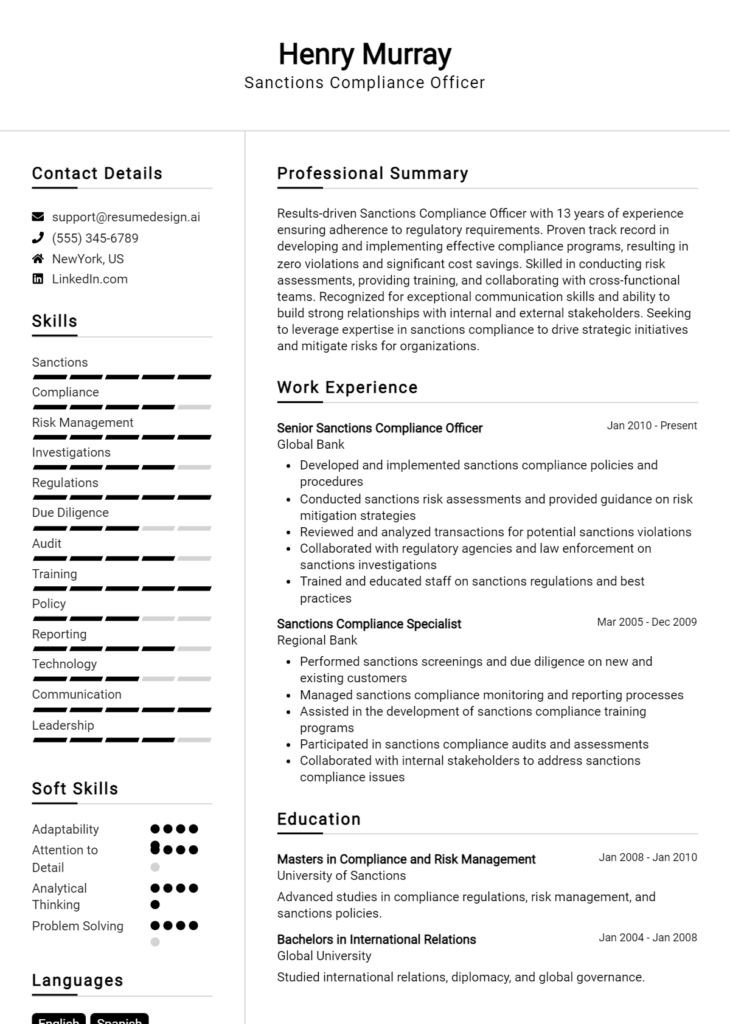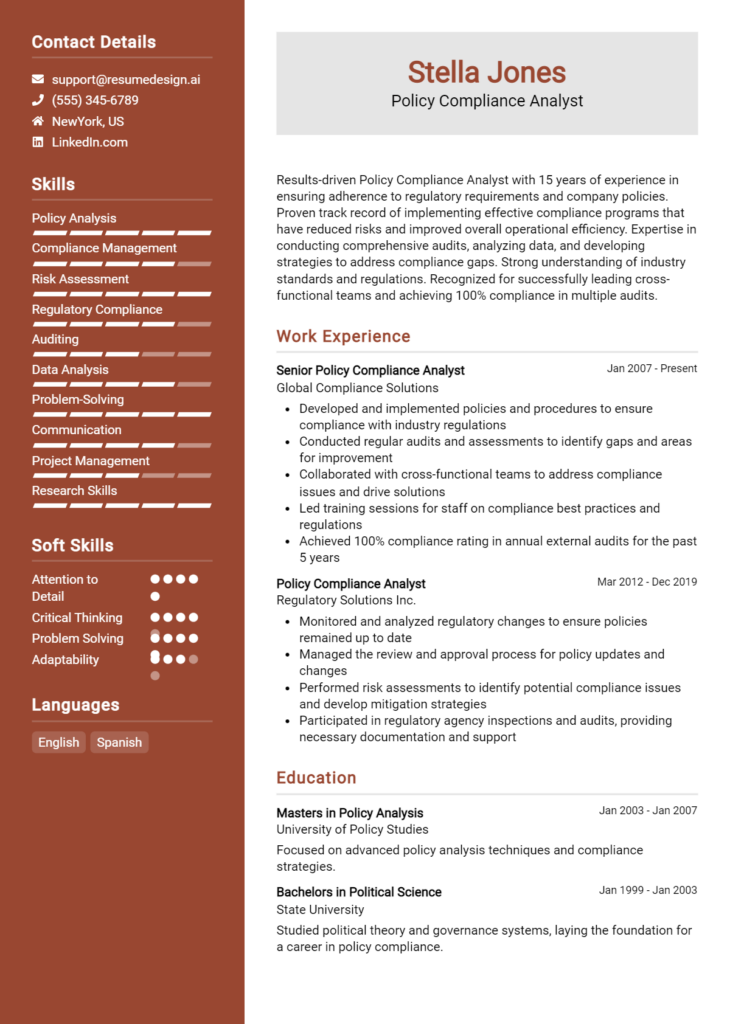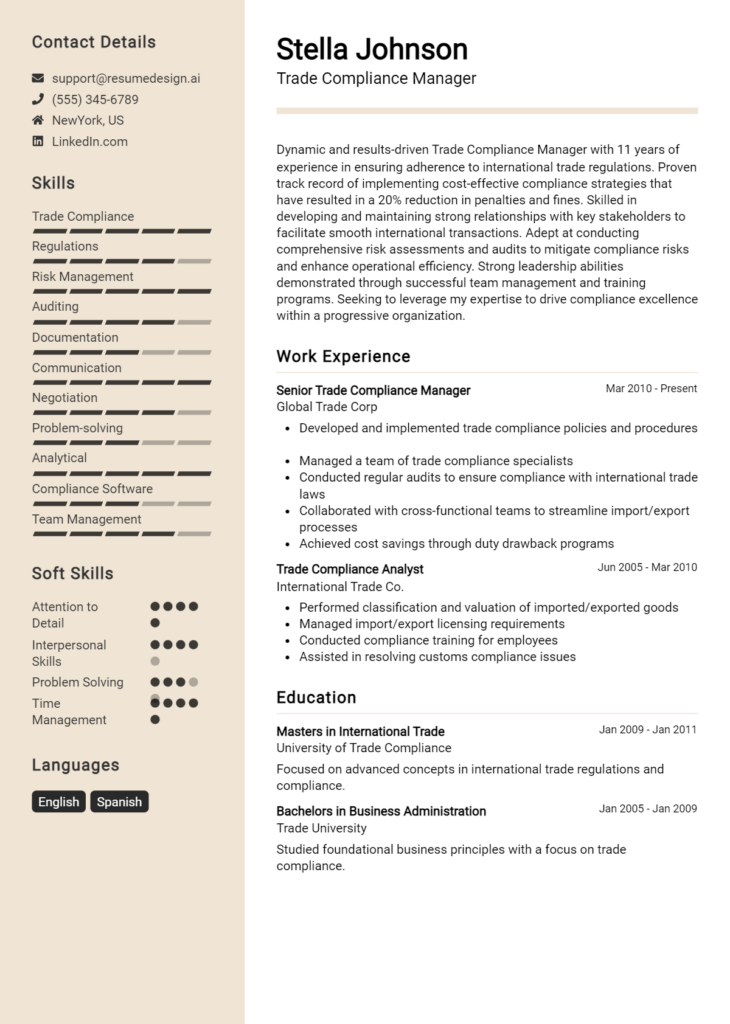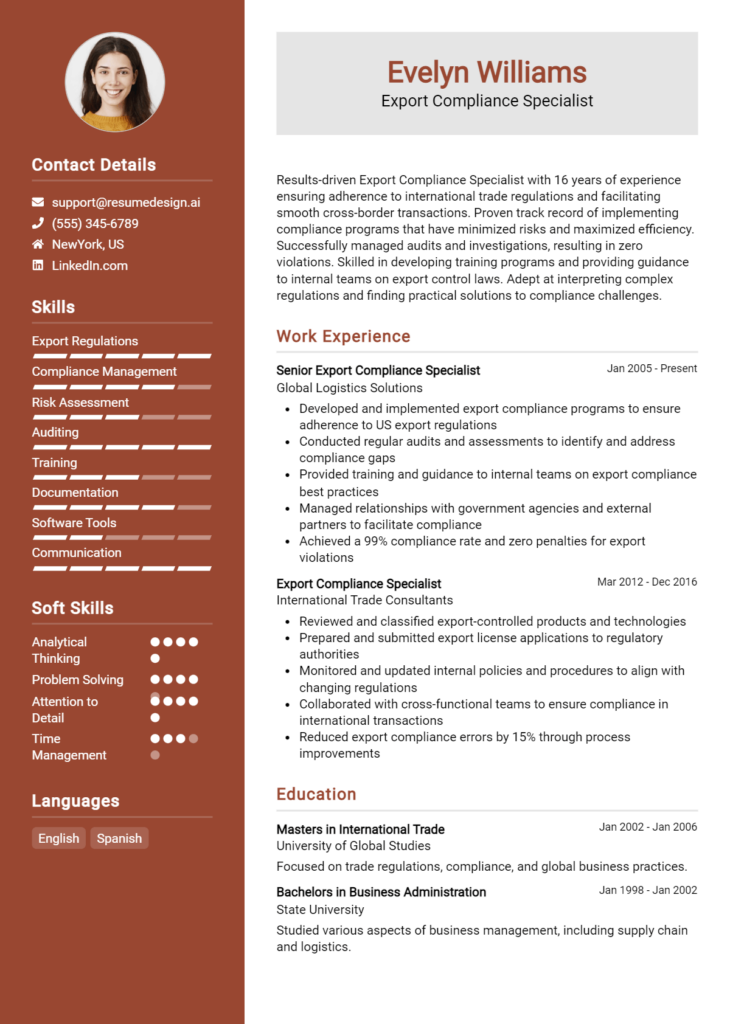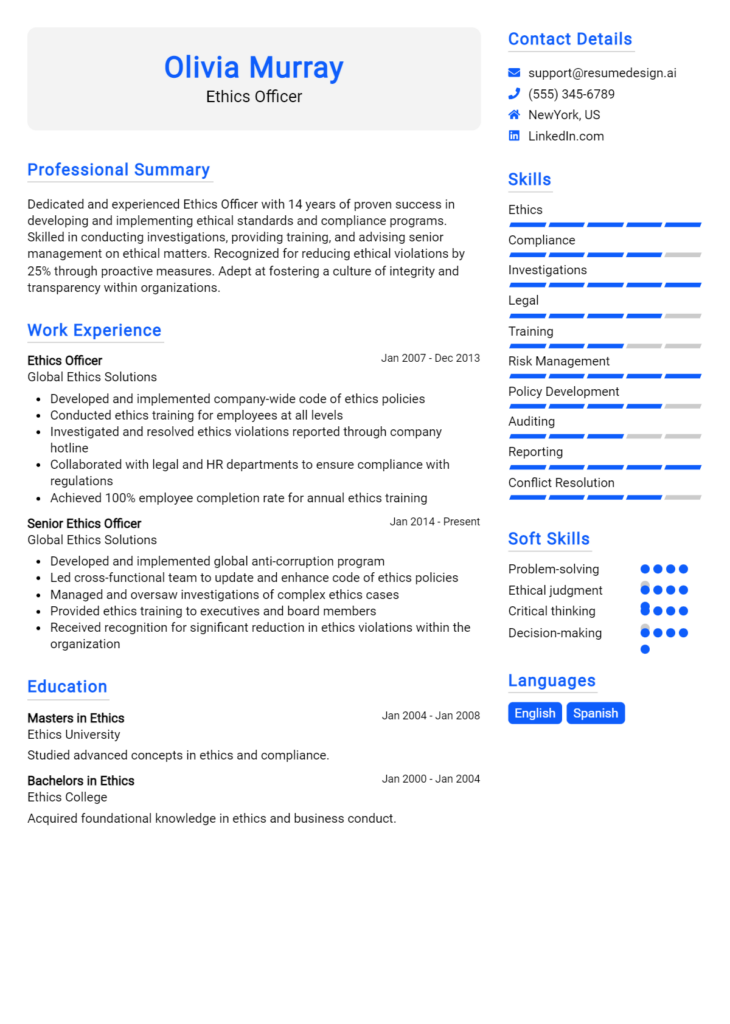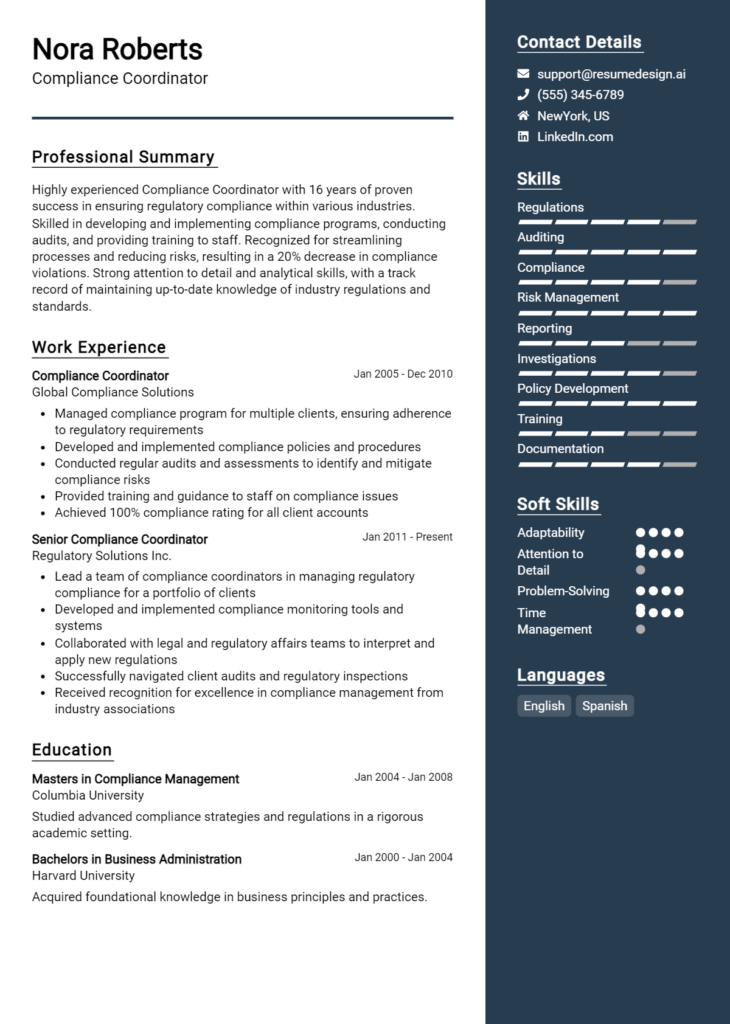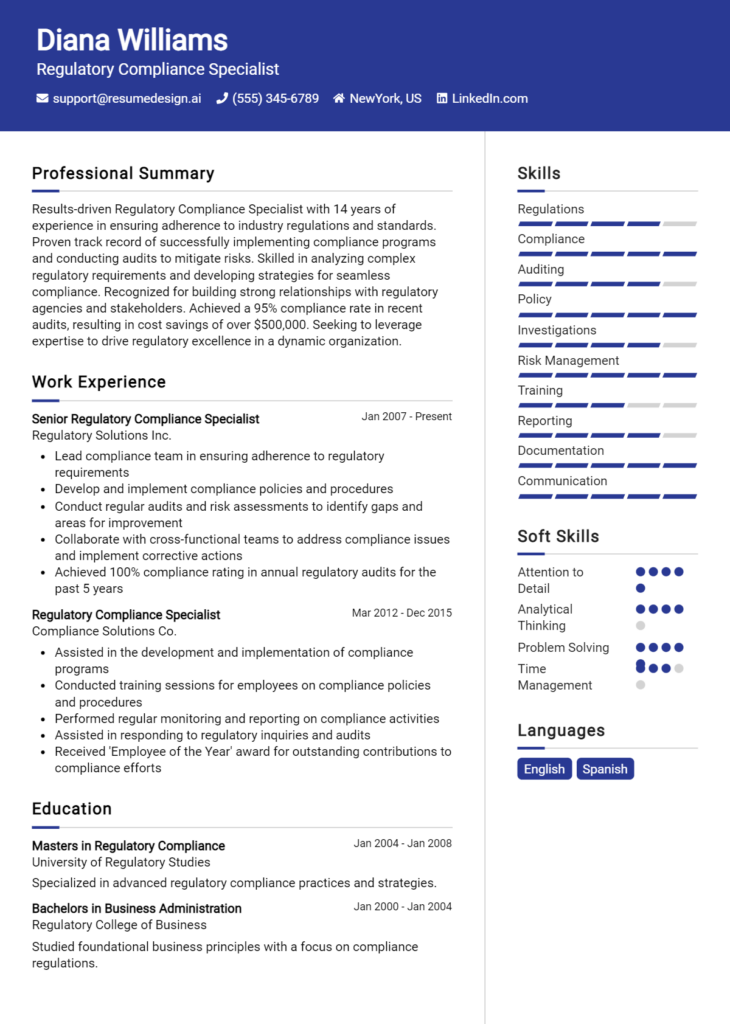Compliance Analyst Core Responsibilities
A Compliance Analyst plays a crucial role in ensuring that an organization adheres to regulatory standards and internal policies. Key responsibilities include monitoring compliance with laws, conducting audits, and analyzing data to identify potential risks. They bridge different departments by facilitating communication and collaboration between legal, finance, and operational teams. Strong technical, operational, and problem-solving abilities are essential for success in this role. Effectively showcasing these skills on a well-structured resume can significantly contribute to achieving an organization's overall goals.
Common Responsibilities Listed on Compliance Analyst Resume
- Conduct compliance audits and assessments to ensure adherence to regulations.
- Develop and implement compliance policies and procedures.
- Monitor changes in legislation and assess their impact on the organization.
- Prepare reports and presentations for management on compliance issues.
- Coordinate training sessions for staff on compliance-related topics.
- Investigate compliance breaches and recommend corrective actions.
- Maintain up-to-date knowledge of industry standards and best practices.
- Collaborate with legal and operational teams to address compliance concerns.
- Assist in the development of risk management strategies.
- Utilize compliance software and tools for data analysis and reporting.
High-Level Resume Tips for Compliance Analyst Professionals
In the competitive landscape of compliance analysis, a well-crafted resume serves as your first and often only chance to make a strong impression on potential employers. Your resume is not just a list of past jobs; it’s a powerful marketing tool that should effectively reflect your unique skills, relevant achievements, and deep understanding of compliance regulations. As you embark on your job search, it’s crucial to ensure that your resume stands out in a sea of applicants. This guide will provide practical and actionable resume tips specifically tailored for Compliance Analyst professionals to help you present your qualifications in the best light.
Top Resume Tips for Compliance Analyst Professionals
- Tailor your resume to match the job description, using keywords that align with the specific compliance role you are applying for.
- Highlight relevant experience by showcasing positions where you successfully enforced compliance regulations or developed compliance programs.
- Quantify your achievements with specific metrics, such as the percentage of regulatory audits passed or the reduction in compliance-related risks.
- Include industry-specific skills, such as knowledge of regulatory frameworks (e.g., GDPR, HIPAA) and familiarity with compliance software tools.
- Use clear and concise language, avoiding jargon unless it is widely recognized in the compliance industry.
- Incorporate a summary statement that captures your expertise and career goals, making it easy for employers to see your value at a glance.
- Showcase certifications and ongoing education relevant to compliance, such as Certified Compliance & Ethics Professional (CCEP) or Certified Regulatory Compliance Manager (CRCM).
- Emphasize soft skills such as attention to detail, analytical thinking, and effective communication, which are critical in compliance roles.
- Keep the formatting clean and professional, using bullet points for easy readability and ensuring consistency in font and style.
Implementing these tips can significantly increase your chances of landing a job in the Compliance Analyst field. By crafting a resume that effectively highlights your qualifications and aligns with the expectations of employers, you'll position yourself as a compelling candidate who stands out in a competitive job market.
Why Resume Headlines & Titles are Important for Compliance Analyst
In the competitive landscape of compliance roles, a resume headline or title serves as a critical first impression for hiring managers. For a Compliance Analyst, a strong headline can capture attention immediately, succinctly summarizing a candidate's key qualifications and expertise in just a few words. This impactful phrase should be concise and relevant, directly aligned with the specific job being applied for, ensuring that it resonates with the employer's needs. An effective headline not only differentiates a candidate from the crowd but also sets the tone for the rest of the resume, making it essential for individuals seeking to advance their careers in compliance.
Best Practices for Crafting Resume Headlines for Compliance Analyst
- Keep it concise: Aim for one to two impactful phrases.
- Be role-specific: Tailor your headline to the Compliance Analyst position.
- Highlight key qualifications: Emphasize your most relevant skills and experiences.
- Use industry-specific terminology: Incorporate keywords that resonate with the compliance field.
- Showcase accomplishments: If possible, include measurable achievements.
- Avoid generic terms: Steer clear of vague phrases like “hard worker” or “team player.”
- Maintain professionalism: Ensure the tone is suitable for a corporate environment.
- Update regularly: Revise your headline to reflect your most current skills and experiences.
Example Resume Headlines for Compliance Analyst
Strong Resume Headlines
Experienced Compliance Analyst with a Proven Track Record in Regulatory Adherence
Detail-Oriented Compliance Specialist Skilled in Risk Assessment and Mitigation Strategies
Dynamic Compliance Analyst with Expertise in Data Privacy and Financial Regulations
Certified Compliance Professional with 5+ Years of Experience in Audit and Reporting
Weak Resume Headlines
Looking for a Job
Compliance Analyst Seeking Opportunities
Hardworking Individual Ready to Contribute
The strong headlines are effective because they immediately convey specific skills, experiences, and accomplishments that relate directly to the Compliance Analyst role, capturing the hiring manager's interest. They are tailored to the job and present the candidate as a qualified professional. In contrast, the weak headlines fail to impress due to their vagueness and lack of detail; they do not communicate any unique selling points or relevant qualifications, making it difficult for employers to see the candidate's potential fit for the position.
Writing an Exceptional Compliance Analyst Resume Summary
A resume summary for a Compliance Analyst is a crucial component that serves as a powerful introduction to your professional profile. It provides hiring managers with a quick snapshot of your qualifications, emphasizing key skills, relevant experience, and notable accomplishments pertinent to the compliance field. A well-crafted summary should be concise yet impactful, effectively tailored to the specific job you are applying for, allowing you to stand out in a competitive job market.
Best Practices for Writing a Compliance Analyst Resume Summary
- Quantify achievements whenever possible to demonstrate your impact.
- Focus on key compliance-related skills such as regulatory knowledge, risk assessment, and auditing.
- Tailor your summary to align with the job description and company values.
- Use action verbs to convey a sense of proactivity and leadership.
- Highlight relevant certifications or training that enhance your credibility.
- Keep it concise—aim for 3-5 sentences that capture your essence.
- Showcase your ability to communicate complex compliance issues effectively.
- Incorporate keywords from the job posting to improve visibility in applicant tracking systems.
Example Compliance Analyst Resume Summaries
Strong Resume Summaries
Detail-oriented Compliance Analyst with over 5 years of experience in regulatory compliance and risk management. Successfully reduced compliance violations by 30% through the implementation of streamlined auditing processes. Proven ability to interpret complex regulations and convey them to cross-functional teams.
Dynamic Compliance Analyst with a track record of enhancing corporate governance frameworks. Spearheaded a project that increased compliance reporting efficiency by 40%, resulting in significant cost savings. Strong expertise in conducting risk assessments and developing training programs for staff.
Results-driven Compliance Analyst with 7 years in the financial services industry. Achieved a 25% decrease in regulatory fines through the development of an effective compliance monitoring system. Skilled in data analysis and policy development to ensure adherence to federal and state regulations.
Weak Resume Summaries
Experienced Compliance Analyst seeking new opportunities in compliance. Good at understanding regulations and working with teams.
Compliance professional with a background in various industries. Interested in enhancing compliance processes and helping companies follow the rules.
The examples of strong resume summaries highlight specific achievements, use quantifiable metrics, and demonstrate relevant skills that align directly with the Compliance Analyst role. In contrast, the weak summaries lack detail, are overly generic, and fail to convey any measurable outcomes or unique qualifications, making them less impactful in capturing a hiring manager's attention.
Work Experience Section for Compliance Analyst Resume
The work experience section of a Compliance Analyst resume is critical as it serves as a testament to the candidate's professional journey, showcasing their technical skills and ability to navigate complex regulatory environments. This section not only reflects the analyst's proficiency in compliance processes but also their capacity to manage teams and deliver high-quality outcomes. To stand out, candidates must quantify their achievements and ensure that their experiences align with industry standards, demonstrating a clear impact on organizational compliance and risk management efforts.
Best Practices for Compliance Analyst Work Experience
- Highlight specific compliance frameworks and regulations you have worked with, such as SOX, GDPR, or HIPAA.
- Quantify your achievements with metrics, such as the percentage of compliance improvement or the reduction in audit findings.
- Showcase instances where you led or contributed to compliance audits or assessments.
- Include examples of collaboration with cross-functional teams to enhance compliance processes.
- Demonstrate your ability to identify and mitigate compliance risks effectively.
- Use action verbs to describe your contributions and responsibilities clearly.
- Tailor your experience to reflect the specific requirements of the job you are applying for.
- Incorporate any relevant certifications or training that augment your technical expertise in compliance.
Example Work Experiences for Compliance Analyst
Strong Experiences
- Led a team of 5 in conducting a comprehensive internal audit, resulting in a 30% decrease in compliance violations over one year.
- Developed and implemented a new compliance training program that improved employee adherence to regulatory requirements by 40%.
- Collaborated with IT and legal departments to enhance data protection measures, achieving full compliance with GDPR ahead of the deadline.
- Managed the compliance reporting process, successfully reducing report preparation time by 25% while maintaining accuracy and completeness.
Weak Experiences
- Assisted in compliance tasks as needed.
- Worked with the compliance team on various projects.
- Helped prepare compliance documents for audits.
- Participated in meetings regarding compliance issues.
The examples listed as strong experiences are considered effective because they articulate specific achievements with measurable outcomes, demonstrating both leadership and technical expertise in compliance. In contrast, the weak experiences lack detail and quantifiable results, making them less impactful and failing to highlight the candidate's actual contributions or skills in the compliance field.
Education and Certifications Section for Compliance Analyst Resume
The education and certifications section of a Compliance Analyst resume is crucial for demonstrating the candidate's academic foundation and professional qualifications. This section not only outlines the candidate's formal education but also showcases industry-relevant certifications and ongoing learning efforts that are essential in the ever-evolving field of compliance. By including relevant coursework, certifications, and specialized training, candidates can significantly enhance their credibility and illustrate their commitment to staying updated with industry standards and regulations, thereby aligning themselves with the specific requirements of the job role.
Best Practices for Compliance Analyst Education and Certifications
- Prioritize relevant degrees such as a Bachelor's or Master's in Finance, Business, Law, or a related field.
- Include industry-recognized certifications like Certified Compliance and Ethics Professional (CCEP) or Certified Information Systems Auditor (CISA).
- Highlight specialized training in compliance software or regulatory frameworks pertinent to the industry.
- Provide detailed descriptions of relevant coursework that align with compliance responsibilities.
- Keep the section concise while ensuring it captures the most impactful educational experiences.
- Update the section regularly to include new certifications or completed courses that reflect ongoing professional development.
- Use clear formatting to make the information easy to read and accessible for hiring managers.
Example Education and Certifications for Compliance Analyst
Strong Examples
- Bachelor of Science in Finance, University of XYZ, 2020
- Certified Compliance and Ethics Professional (CCEP), 2021
- Master's in Business Administration with a focus on Risk Management, University of ABC, 2022
- Relevant Coursework: Regulatory Compliance, Risk Assessment, and Financial Crime Prevention
Weak Examples
- Bachelor of Arts in English Literature, University of DEF, 2015
- Certificate in Basic Computer Skills, 2018
- Outdated certification in Quality Assurance, 2017
- High School Diploma, 2010
The strong examples are considered effective because they directly relate to the skills and knowledge required for a Compliance Analyst position, showcasing relevant degrees, recognized certifications, and pertinent coursework. In contrast, the weak examples fail to demonstrate industry relevance or current competency in compliance, potentially raising concerns regarding the candidate's qualifications and preparedness for the role.
Top Skills & Keywords for Compliance Analyst Resume
The role of a Compliance Analyst is crucial in ensuring that organizations adhere to legal standards and internal policies. A well-crafted resume that highlights the right skills can significantly enhance a candidate's chances of landing an interview. Skills not only demonstrate a candidate's qualifications but also their ability to navigate complex regulatory environments, analyze data effectively, and communicate compliance requirements clearly. Thus, including relevant skills on a Compliance Analyst resume is imperative for showcasing expertise and readiness for the role.
Top Hard & Soft Skills for Compliance Analyst
Soft Skills
- Attention to Detail
- Strong Analytical Skills
- Effective Communication
- Problem-Solving Abilities
- Ethical Judgment
- Time Management
- Adaptability
- Team Collaboration
- Critical Thinking
- Conflict Resolution
Hard Skills
- Knowledge of Regulatory Frameworks (e.g., GDPR, HIPAA)
- Risk Assessment and Management
- Data Analysis and Reporting
- Familiarity with Compliance Software
- Policy Development and Implementation
- Audit Procedures
- Documentation and Record-Keeping
- Financial Analysis
- Research Skills
- Project Management
Incorporating both soft and hard skills into your resume will not only showcase your qualifications as a Compliance Analyst but also highlight your ability to contribute to your organization's compliance efforts effectively. Additionally, relevant work experience should further reinforce these skills, demonstrating your practical application in real-world scenarios.
Stand Out with a Winning Compliance Analyst Cover Letter
I am excited to apply for the Compliance Analyst position at [Company Name], as advertised on [Job Board/Company Website]. With a strong background in regulatory compliance and risk management, coupled with my analytical skills and attention to detail, I am confident in my ability to contribute to your team and help ensure that [Company Name] maintains the highest standards of compliance with both internal policies and external regulations.
In my previous role at [Previous Company Name], I successfully conducted compliance audits and assessments, identifying potential risks and implementing corrective measures that led to a 20% improvement in compliance metrics over one year. My experience includes developing and delivering training programs for staff on compliance policies and procedures, which enhanced their understanding and adherence to regulatory requirements. I am well-versed in industry regulations and possess a keen ability to analyze complex data and provide actionable insights to support informed decision-making.
I am particularly drawn to this opportunity at [Company Name] due to your commitment to ethical practices and excellence in compliance. I believe that my proactive approach to identifying compliance gaps and my ability to collaborate with cross-functional teams will align well with your organizational goals. I am eager to bring my expertise in compliance analysis and my passion for upholding regulatory standards to your esteemed company.
Thank you for considering my application. I look forward to the opportunity to discuss how my skills and experiences can contribute to the ongoing success and integrity of [Company Name]. I am excited about the possibility of being part of your team and helping to drive compliance initiatives forward.
Common Mistakes to Avoid in a Compliance Analyst Resume
When crafting a resume for a Compliance Analyst position, it's crucial to present yourself in the best light to potential employers. Many candidates overlook key elements that could strengthen their application, leading to common pitfalls. Avoiding these mistakes can significantly enhance your chances of standing out in a competitive job market. Here are some common mistakes to watch out for:
Vague Job Descriptions: Failing to provide specific details about your previous roles can make it difficult for employers to gauge your experience. Use quantifiable achievements to illustrate your impact.
Ignoring Keywords: Many companies use Applicant Tracking Systems (ATS) to filter resumes. Not incorporating relevant keywords from the job description can result in your resume being overlooked.
Overly Complex Language: Using jargon or complex terminology may confuse the reader. Aim for clear, concise language that effectively communicates your qualifications.
Lack of Relevant Experience: Including unrelated work experience can dilute your resume. Focus on roles and responsibilities that align closely with compliance and regulatory standards.
Neglecting Soft Skills: Compliance Analysts need strong analytical and interpersonal skills. Failing to highlight these soft skills can make your resume less compelling, as they are often just as important as technical abilities.
Formatting Issues: A cluttered or inconsistent format can detract from your professionalism. Ensure your resume is easy to read, with a clean layout and consistent font styles.
Not Tailoring the Resume: Sending out a generic resume for every application can be detrimental. Tailoring your resume to match the specific requirements of each job can demonstrate your genuine interest in the position.
Omitting Certifications: Compliance roles often require specific certifications. Failing to mention relevant certifications can undermine your qualifications and suggest a lack of commitment to professional development.
Conclusion
As we’ve explored, the role of a Compliance Analyst is critical in ensuring organizations adhere to legal standards and internal policies. Key responsibilities include conducting compliance audits, monitoring regulatory changes, and collaborating with various departments to develop effective compliance strategies. A Compliance Analyst must possess strong analytical skills, attention to detail, and a thorough understanding of relevant regulations.
To position yourself effectively for this role, it's essential to keep your resume up to date and tailored to highlight your expertise in compliance matters. Take the time to review your Compliance Analyst resume, ensuring it showcases your skills, experience, and accomplishments in the field.
To assist you in this process, consider utilizing available tools that can enhance your resume. Explore resume templates for structured designs, use the resume builder for a guided creation process, check out resume examples for inspiration, and don’t forget about cover letter templates to complement your application package.
Start refining your resume today to stand out in this competitive field!

